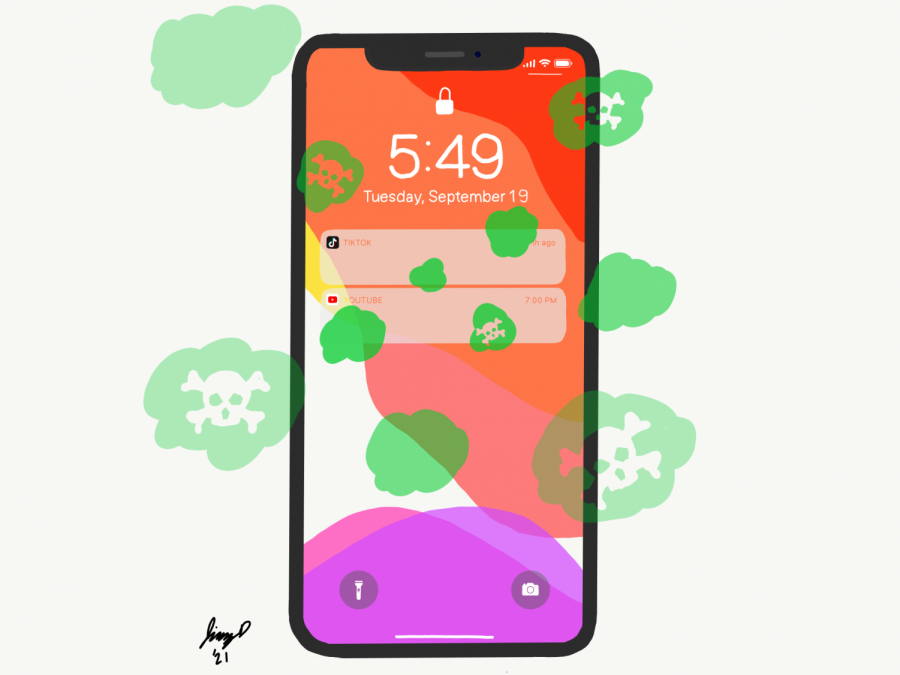Money or Influence: Which Should People Choose?
While social media serves as a platform to express creativity, it also serves as a breeding ground for deceitful intentions. Although influencers know their viewer demographics, they misuse their content monetization by uploading inappropriate content for their viewers. As the population of teenagers on social media increases, so does the amount of influencers that abuse their platform for popularity.
The number of teenagers on social media who are inspired to grow their careers to become influencers is growing steadily. According to Smart Social, 87% of teenagers used social media in 2019, and 12% of those use social media as a profession. They range from being lifestyle vloggers on YouTube, dancers on TikTok, and beauty gurus on Instagram. Although influencers make money, gaining clout becomes the main objective for posting on social media platforms. For instance, Olivia Ponton, a TikToker known for her dancing and lip-syncing videos, posted a video of herself dancing in a crop top and jeans with a caption of “I just ate.” Ponton’s Tiktok promotes a negative body image to her 1.8 million followers by flaunting that she can stay skinny even after she eats. Many of her followers are impressionable youth who are determinately affected by the social norms of society. Although comments that criticized Ponton’s message flooded in, they only served to increase the popularity of the video because of Tiktok’s algorithm.
Unlike Ponton, many individuals on TikTok have better intentions which are to post positive content to create a safe environment for their audience. Om Patel, ’22, says, “Making others feel safe, welcomed, and happy is mainly the reason I have a social media platform.” Patel intends to entertain and respect his viewers through his content. He also says, “I also post about current issues in the United States and worldwide, such as posts about climate change, systemic racism, police brutality, the mass genocide [of] Uyghur Muslims, the Yemeni Crisis, and of course, the Coronavirus pandemic.” Although his following is not large, he tries his best to show others the truth in political and social matters while those who have millions of followers rarely consider posting about worldwide issues. The difference between influencers like Ponton and Patel shows the true nature of creators who post for their benefit rather than helping others. People like Patel help create a change in society to voice issues while individuals like Ponton become part of the problem that fuels these matters.
Creators focus on the tangible aspects instead of personal connections to their work. For instance, YouTubers have a common goal of making money. According to Natalie Robehmed at Forbes, vloggers such as Logan Paul “make around 12.5 million dollars every year.” Paul is known for filming the dead body of a suicide victim in Japan’s suicide forest. His disregard for basic human respect shows his selfish nature as he knew that he would make thousands off of his video. His viewers consist of young teenagers who need guidance between what is right and wrong. These children are taught by Paul’s video that it is okay to film anything and everything they see. Morally, the youth will see Paul’s behavior as being accepted in society when in reality, it is immoral to use a suicide victim as clickbait.
As TikTok influencer Srinidhi Subramanian, ’19, says, “Before posting any video I try to ask myself if what I’m putting out there is blatantly offensive/hurtful, and if it is, I won’t post it… because the underlying intent behind my videos is to positively impact my viewers.” The intentions of Subramanian and Paul show the two types of people, creators who are there to make money, and creators who are there to resonate and connect with their audience.
While social media serves as a medium for creative expression, it is also a breeding ground for deceitful intentions. Creators find unethical money-making tactics and as a result, the behavior of creators can be harmful impressions on the youth of today’s society. This can lead youth to believe that posting unethical content can make them rich and popular without any consequences. These troublesome influencers do not deserve forgiveness for the multiple opportunities that they were given to repent for their mistakes but instead should be kicked off of their social media platforms.
Your donation will support the student journalists of Glenbard North High School. Your contribution will allow us to pay for training sessions and cover our annual website hosting costs.

